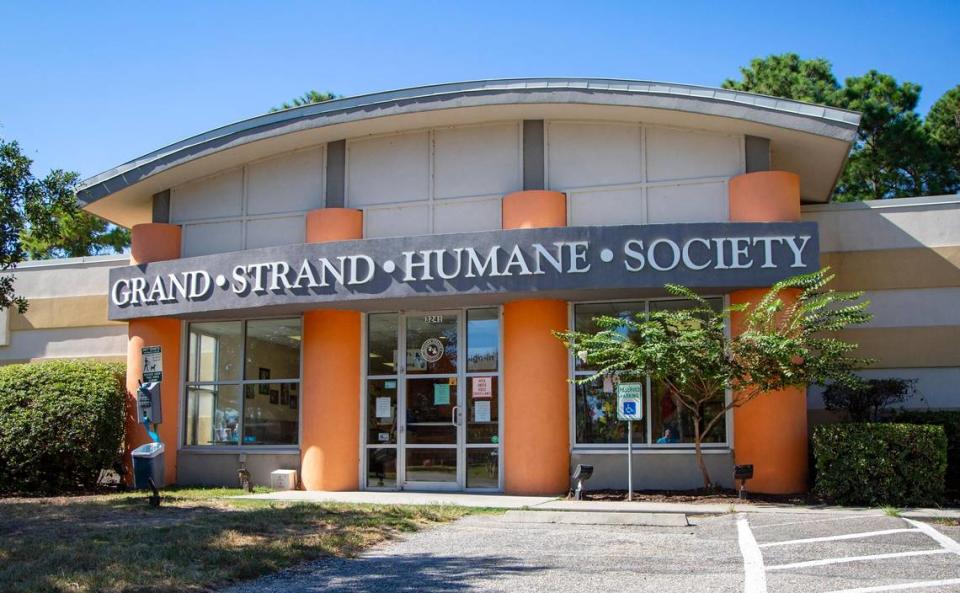Myrtle Beach shelter bought ‘black market’ cat drugs from China, irking city officials
The Grand Strand Humane Society’s decision to buy and administer an experimental cat drug has drawn the ire of Myrtle Beach officials, who are reconsidering their support of the shelter as a result.
The nonprofit’s purchases of the feline infectious peritonitis (FIP) treatment, first reported by MyrtleBeachSC.com, occurred during the fall of 2020, but stopped months later when city officials expressed concerns, according to Board President Lindsey Rankin.
Because the drug, known as GS-441524, is not approved by the U.S. Food and Drug Administration for use on cats, shelters and pet owners seeking this potential cure for an otherwise fatal infection have turned to manufacturers in China, who will often ship the compound to U.S. residents in unmarked vials in exchange for thousands of dollars, a recent story in The Atlantic explained.
Clinical tests have shown the drug to be effective in treating FIP, but Gilead, which invented and patented the compound, has refused to license it for animal use out of fear it could impact FDA approval of Remdesivir, a nearly identical antiviral being used to treat severe cases of COVID-19 in humans, according to The Atlantic.
Rankin confirmed that the shelter’s executive director found a private citizen through a Facebook group and gave him about $11,000 in exchange for getting the drugs from a Chinese manufacturer. Executive director Jessica Wnuk did not respond to a request for comment.
Those drugs were administered to seven cats diagnosed with FIP, with four dying and three surviving, according to Rankin, who added that the cats who died likely didn’t start treatment soon enough.
“The mission of the Grand Strand Humane Society is to save the animals that are in our care,” she said. “These were abandoned cats, found cats and strays, and our mission and the reason I think a lot of people support our facility and our mission is we save animals. We don’t give up on animals.”

Without the use of the experimental drug, all seven cats would’ve been humanely euthanized to ease their suffering, Rankin confirmed.
While the shelter hasn’t purchased or administered the FIP treatment since 2020, the issue has resurfaced after the organization shared a fundraiser on its social media pages in late 2021 from one of its volunteers who was purchasing the drug herself to care for cats she had adopted from the shelter.
Myrtle Beach scrutiny
Officials from the City of Myrtle Beach, which appoints two members of the nonprofit’s board and grants the shelter more than $200,000 annually, then expressed concerns with the organization having any association with the drug.
“The city does not support the use of unapproved, ‘black market’ drugs for the treatment of cats with feline infectious peritonitis (FIP),” city spokesman Mark Kruea wrote in a statement to The Sun News. “Nor does the city support the solicitation of donations or donations to outside groups for that purpose.
“City staff members have met with members of the Humane Society board and have expressed to them this concern about the shelter’s direction. To my knowledge, no decisions have been made about the city’s future relationship with the shelter, but all options are on the table.”
After conversations with city officials, the shelter decided not to share any future fundraisers for the drug, and Rankin emphasized that no taxpayer dollars were used on the drugs with the $11,000 coming from their separate critical care fund, which was then replenished with a fundraiser in November 2020.
The purchase did not require board approval because emergency purchases are made by discretion of the executive director, Rankin said, though some board members did have issues with the process.
Two board members have left the organization since those purchases including Carol Wallauer, who was board president at the time. Wallauer and Sophie Marabal, the other board member who left, declined to comment.
Past shelter issues
The Grand Strand Humane Society previously went through significant turnover among its board back in 2018, though for nearly the opposite reason.
Former board president Elena Nicholas resigned after a motion was made to fire her due, in part, to a high number of shelter animals being euthanized, The Sun News reported in April 2018. The shelter had euthanized 408 animals between April 2015 and April 2018, and some board members were questioning whether animals with treatable diseases such as ringworm were among those figures.
Nicholas was among six board members to leave the organization around that time, The Sun News reported.
Rankin said she’s hopeful the organization can quickly move past this recent controversy, continue its important relationship with the city and, most importantly, focus on taking care of the animals at its shelter.

